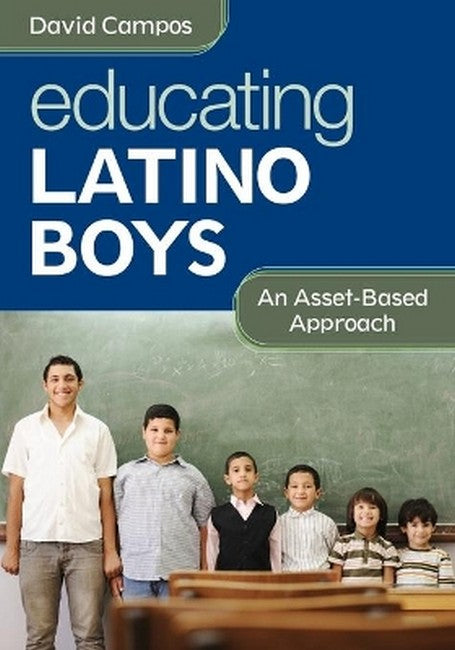David Campos began his education career more than 20 years ago when he started teaching second grade. He later entered graduate school, taught ESL, and worked in corporate training and development. In 1996, he earned his Ph.D. at The University of Texas at Austin specializing in learning disabilities and behavior disorders. His first job in academia was at Roosevelt University (Chicago, IL) where he was an Assistant Professor in the College of Education. There he also served as Director of the Metropolitan Institute for Teaching and Learning and was Acting Assistant Dean of Academic Affairs. After earning rank and tenure he accepted an Associate Professor of Education position at the University of the Incarnate Word (San Antonio, TX). He has written three books grounded in youth sexuality: Sex, Youth, and Sex Education; Diverse Sexuality in Schools; and Understanding Gay and Lesbian Youth. And, his most recent books: Expanding Waistlines: An Educator's Guide to Childhood Obesity and Jump Start Health! Practical Ideas to Promote Wellness to Kids of All Ages serve to educate readers about childhood health. He also co-authored a resource text and evaluation instrument for teachers of English language learners titled, Practical Ideas that Really Work for English Language Learners, and co-authored another titled Reaching Out to Latino Parents of English Language Learners. His peer-reviewed articles focus on constructivist teaching and authentic assessment by way of African American visionaries. David spends his time between San Antonio, Austin, and his parents' lake home outside of Marble Falls, Texas.
Request Academic Copy
Please copy the ISBN for submitting review copy form
Description
A Few Words Before Starting Part I. Framing the Scope and Purpose of the Book 1. Introduction Examining the Education of Latino Boys Is Important Latino Boys Have Assets Why Latino Is Used Rather Than Hispanic Summary 2. Cultural Conflict Between Latino Boys and School Unfavorable Perceptions of Latino Boys How Schools Fail to Meet Latino Boys' Needs Boy Behaviors That Do Not Fit With Schools' Expectations Summary "What Can I Do Next?" Implications for the Classroom Part II. Circumstances of Contemporary Latino Boys 3. Data Trends Associated With Latino Boys Demographic Trends Among Latinos in the United States The Academic Achievement of Latino Students The Significance of Teacher Quality Summary 4. The Cultural Background of Latino Boys The Heterogeneity of the Latino Culture Common Latino Cultural Values Summary "What Can I Do Next?" Implications for the Classroom Part III. Social Forces That Affect Latino Boys' School Performance 5. The Differing Kinds of Capital in the Lives of Latino Boys The Challenges of Poverty Physical Capital Human Capital Cultural Capital Social Capital Summary 6. The Balancing Act That Latino Boys Perform The Challenge of Acculturating The Worry Over Immigration The Stress of Learning English Summary "What Can I Do Next?" Implications for the Classroom Part IV. Teachers and Schools Can Enhance Latino Boys' Success 7. Enhancing Latino Boys' Success at School Instructional Practices in the Classroom Fostering a Positive Sense of School Attachment Summary 8. Programs for Latino Boys A Few Words About Program Effectiveness Programs Designed to Help Latino Youth Advocacy Organizations That Work to Empower Latinos Summary "What Can I Do Next?" Implications for the Classroom Final Thoughts References About the Author Acknowledgments Index
" David Campos has written a book that will be extremely useful for teachers, educational leaders in general, and school administrators in particular. His careful description of the cultural context of Latino boys is groundbreaking and should awaken all of us. He makes a persuasive case for the need to examine the lived experience of Latino boys and the implications for policy and practice. His many examples are powerful, imaginative, and supported by data. The book is engaging, fascinating, and a solid addition to the literature on the culturally relevant curriculum. I will definitely use this book in my classes to illustrate this topic." -- Valerie J. Janesick, Professor "With passionate concern and a probing insight drawn from experiences as both learner and educator, David Campos deconstructs the complex factors affecting the academic success of Latino boys in our schools today and compels us to embrace the need for change. This book is a must-read for all classroom educators who genuinely want to find solutions to the crippling effects of the achievement gap on the fastest growing subpopulation in our country." -- Kathleen Palmer Cleveland, Author of Teaching Boys Who Struggle in School "Campos (Univ. of the Incarnate Word) begins his book with the statement that 'Latino boys are often appraised from a deficit perspective because school leaders and teachers appraise students of color using the middle-class, dominant-culture frame of reference.' That is, Latino boys fall short because that standards to which they are held are inappropriate to them. To assauge educators, Campos notes, 'I don't think that school professionals are aware that they are appraising Latino boys in such a fashion.' The irony is that in the pronouncement of an educatior bias, the author does not recognize his own. His evidence is largely anecdotal, and when hard data are introduced (chapter 3, for example), the explanations are made to fit the thesis. The book's importance turns on the degree to which education should be adjusted for ethnic group difference. For those believing that education 'wrong-foots' Latino males by failing to recognize their strengths, the author provides confirmation. To those less sure that achievement differences refelct the vagaries of educator appraisal, the book will be less important." -- CHOICE

